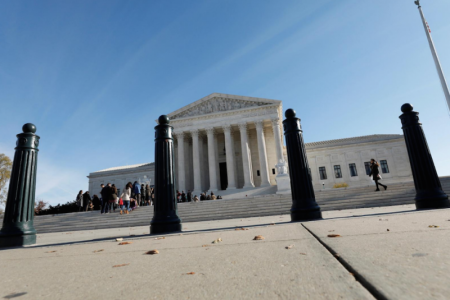'Undue hardship’ or ‘religious liberty’? Supreme Court weighs if postal carrier must work on Sundays

The U.S. Supreme Court heard arguments Tuesday on whether the U.S. Postal Service wrongfully punished a Christian employee who refused to work on Sundays for religious reasons.
The highest court in the nation held oral arguments in the case of Greg Groff v. Louis DeJoy, which centered on a post office employee being ousted from his job because he refused to work on Sundays.
Groff argued that the punishment, which led to him quitting his job, violated Title VII of the Civil Rights Act of 1964, specifically the protections for religious freedom in the workplace.
Groff's attorney, Aaron Streett, told the justices that the government's test for "undue hardship" — a legal principle employers can use to deny basic federally protected accommodations — was faulty, as it did not adequately protest religious liberty.
"Under the government's test, a diabetic employee could receive snack breaks under the [Americans with Disabilities Act], but not under prayer breaks under Title VII, for that might cause lost efficiency," said Streett.
"An employee could receive weekly leave for pregnancy checkups but not to attend mass, for that might require denying a co-worker's shift preference or paying premium wages. There's no reason religious workers should receive lesser protection than those covered by other accommodation statutes."
Justice Sonia Sotomayor asked Streett if it was not an "undue hardship" for an employee to decide not to work on Sundays and religious holidays for a position that required such obligations.
Streett replied that there was no Sunday delivery service when Groff was first hired and that Groff's work duties at the USPS did not specifically include working Sundays and holidays.

A significant point of debate was the 1977 Supreme Court decision Trans World Airlines, Inc. v. Hardison, in which the high court ruled 7-2 that TWA had not violated Title VII when it refused to provide a Saturday sabbath exemption for an employee that would have caused "undue hardship" to the company.
Justice Samuel Alito brought up religious minorities, noting that the court had received amicus briefs from multiple religious communities arguing that "Hardison has violated their right to religious liberty" because of the standard that the 1977 decision gave for religious accommodation.
Chief Justice John Roberts spoke about the changes in religious liberty case law since Hardison was decided, citing recent cases that had broadened religious accommodations in other areas.
"There really is no Establishment Clause problem if you make accommodations for people's religious belief," said Roberts. "So, if you're going to look at this under current law, its not clear that those cases would come out, that Hardison would come out the same way."
U.S. Secretary General Elizabeth Prelogar argued on the government's behalf, claiming that Groff's request for exemption from Sunday work was burdening his workplace.
"The lower courts correctly found an undue hardship on these facts," she stated. "Exempting him from work each and every Sunday would have violated his co-workers' contractual rights at the Post Office."
"His absences created direct concrete burdens on other carriers, who had to stay on their shifts longer to get the mail delivered. That caused problems with the timely delivery of mail and it actually produced employee retention problems, with one carrier quitting, and another carrier transferring, and another carrier filing a union grievance."
Justice Neil Gorsuch emphasized a possible "common ground," wondering aloud if both sides hold similar standards on determining whether an employee can be granted certain exemptions.
Gorsuch found that both sides agreed that religious exemption requests should be "context dependent" and that both sides reject using "de minimis" arguments by themselves.
Although USPS does not normally deliver on Sundays, it will occasionally do so under "certain circumstances," such as delivering priority mail or packages ordered through Amazon.
Groff began working for the USPS in 2012, initially receiving an exemption from working on Sundays when the post offices where he worked began delivering packages on Sundays.
However, beginning in July 2018, Groff's superiors quit giving him an exemption from working on Sundays and increasingly disciplined him for his religiously-influenced refusal to work those days.
In response to the punishments, Groff resigned from his position and filed a lawsuit. U.S. District Judge Jeffrey L. Schmehl, an Obama appointee, dismissed Groff's case in April 2021, while a three-judge panel for the U.S. 3rd Circuit Court of Appeals ruled 2-1 against Groff in May of last year.
Circuit Judge Patty Shwartz, an Obama appointee, argued in the majority opinion that exempting Groff from work on Sundays "would cause an undue hardship" for the postal service.
"Exempting Groff from working on Sundays caused more than a de minimis cost on USPS because it actually imposed on his coworkers, disrupted the workplace and workflow, and diminished employee morale," ruled Shwartz.
Circuit Judge Thomas Hardiman, a George W. Bush appointee, argued in his dissent that "a conflict had to be totally eliminated to result in reasonable accommodation under Title VII."
"Inconvenience to Groff's coworkers alone doesn't constitute undue hardship," Hardiman wrote. "Neither snow nor rain nor heat nor gloom of night stayed Gerald Groff from the completion of his appointed rounds."






















